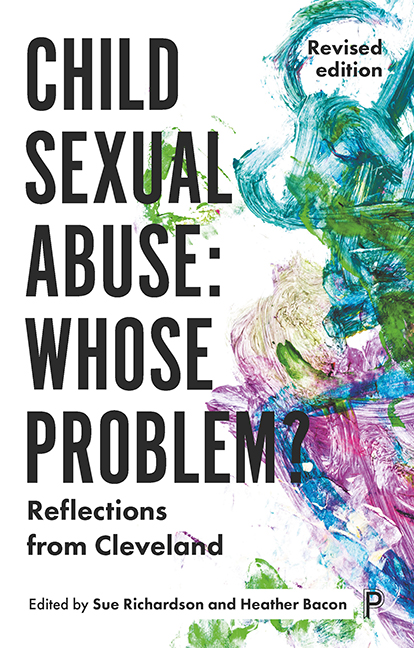Book contents
- Frontmatter
- Dedication
- Contents
- List of tables and figures
- List of abbreviations
- Notes on the editors and contributors
- Acknowledgements
- Preface
- Introduction:Why Cleveland still matters: connections with a new era
- one From Colwell to Cleveland: 1973 to 1988
- two A framework of belief
- three The medical diagnosis of child sexual abuse: the paediatrician’s dilemma
- four After the medical diagnosis: everyone’s dilemma
- five The continuum of disclosure
- six Seen but not heard: the children of Cleveland
- seven The unwanted message: child protection through community awareness
- eight Questions not answers: progressing the debate
- Conclusion:Thirty years later: how far have we progressed?
- Appendix
- References
- Index
one - From Colwell to Cleveland: 1973 to 1988
Published online by Cambridge University Press: 13 April 2022
- Frontmatter
- Dedication
- Contents
- List of tables and figures
- List of abbreviations
- Notes on the editors and contributors
- Acknowledgements
- Preface
- Introduction:Why Cleveland still matters: connections with a new era
- one From Colwell to Cleveland: 1973 to 1988
- two A framework of belief
- three The medical diagnosis of child sexual abuse: the paediatrician’s dilemma
- four After the medical diagnosis: everyone’s dilemma
- five The continuum of disclosure
- six Seen but not heard: the children of Cleveland
- seven The unwanted message: child protection through community awareness
- eight Questions not answers: progressing the debate
- Conclusion:Thirty years later: how far have we progressed?
- Appendix
- References
- Index
Summary
Editors’ summary
This chapter by the senior nursing officer with responsibility for child protection in Cleveland in 1987 sets the scene for the crisis. It first rehearses the stages that Henry Kempe had identified in the public's recognition of child abuse, recognition of sexual abuse being the final stage. It gives a brief historical survey of major incidents of child abuse in the area and describes the development of arrangements for dealing with it. It then recounts the events leading up to the Inquiry, with the arrival of a paediatrician with a new diagnostic approach, the overwhelming of facilities, disagreement with the police surgeon and breakdown of interagency co-operation, intervention by the local MP and inflammatory media coverage.
Each brief clearing of the fog brings out believers who claim fantastic insights, only to be scorned and forced to recant by those who insist that the believers have been bedazzled by an apparition, something false and dangerous.(Summit, 1988, p. 41)
Introduction
The first page of the Report into child abuse in Cleveland in 1987 (Butler-Sloss, 1988, para. 8, p. 1) acknowledges how the judge and her assessors ‘became increasingly aware of the large number of issues causing continuing difficulties which were not unique to Cleveland’. This chapter aims to put events in Cleveland into a wider context based on my experience as a senior nursing officer responsible for child protection in Cleveland up to and including the Inquiry. It explores the local background to the working relationships and growing concern regarding child sexual abuse. A perspective is provided from which to challenge the isolation of Cleveland in response to the diagnosis, between February and July 1987, of 121 children as allegedly sexually abused.
Before we can begin to understand the conflict of Cleveland in 1987, we must look more generally at the relative position and progress of agencies involved in care and protection of children, not forgetting the parents or relatives, or those involved in the voluntary sector. We can relate the wider issues to Kempe's idea that society must go through six stages before child abuse can be eliminated. Firstly, denial that either physical or sexual abuse exists to a significant extent. Secondly, the community pays attention to the more lurid forms of abuse, such as the battered child, and begins to find ways of preventing and coping more effectively with this.
- Type
- Chapter
- Information
- Child Sexual Abuse: Whose Problem?Reflections from Cleveland (Revised edition), pp. 45 - 62Publisher: Bristol University PressPrint publication year: 2018



